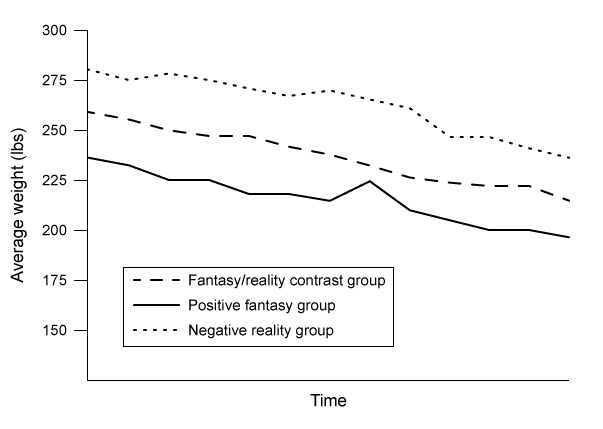Passage Health Psychologists Interested in Studying the Influence of Positive and and Negative
Passage
Health psychologists interested in studying the influence of positive and negative thinking on weight loss conducted a study on 120 obese adults attempting to lose weight. Participants indicated on a scale of 1 to 7 how successful they thought they would be at losing weight (1 = "not successful" and 7 = "very successful") and how much control they believed they had over their success (1 = "no control" and 7 = "complete control") , recorded as expectation of success scores and control of success scores, respectively.Participants were then randomly divided into three groups and asked to complete a 15-minute guided mental exercise twice a day for three weeks. Participants in the fantasy/reality contrast condition were instructed to reflect on two positive aspects of a fantasized weight loss, such as attaining better health and more energy, and two negative aspects of reality that impede weight loss, such as lack of discipline and desire to eat unhealthy foods. Participants in the positive fantasy condition were asked to reflect on four positive aspects of weight loss, and participants in the negative reality condition were asked to reflect on four factors that impede weight loss.At the end of this three-week period, participants began a three-month diet and exercise regimen involving caloric restriction to 1,500 calories per day as well as regular participation in aerobic exercise and weight training. Researchers recorded weekly weights of participants and surveyed participants regarding adherence to proactive weight loss strategies. The results are shown by group in Figures 1 and 2.
 Figure 1 Average weight recorded for each group during three-month follow-up
Figure 1 Average weight recorded for each group during three-month follow-up
 Figure 2 Initial expectation of success score versus average weight loss
Figure 2 Initial expectation of success score versus average weight loss
-If the study researchers concluded that their hypothesis was correct, which of the following was most likely their hypothesis?
A) Positive thinking, as measured by expectation of success scores, will be positively correlated with success at attempted weight loss.
B) Negative thinking, reflecting on the negative aspects that could impede weight loss, will be negatively correlated with success at attempted weight loss.
C) The positive fantasy condition will lose significantly more weight than the fantasy/reality contrast condition and the negative reality condition.
D) Fantasizing about the positive aspects of weight loss will be more effective than thinking about the reality of losing weight, regardless of the expectation of success.
Correct Answer:
Verified
Q103: Passage
The last several decades have seen a
Q104: Passage
Trait theorists believe that all people have
Q105: Passage
Trait theorists believe that all people have
Q106: Passage
Trait theorists believe that all people have
Q107: Passage
The last several decades have seen a
Q109: Passage
The last several decades have seen a
Q110: Passage
Health psychologists interested in studying the influence
Q111: Passage
Trait theorists believe that all people have
Q112: Passage
Health psychologists interested in studying the influence
Q113: Passage
Trait theorists believe that all people have
Unlock this Answer For Free Now!
View this answer and more for free by performing one of the following actions

Scan the QR code to install the App and get 2 free unlocks

Unlock quizzes for free by uploading documents